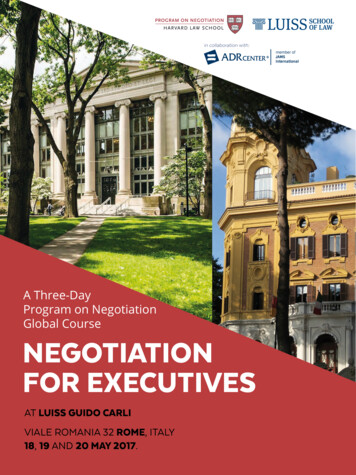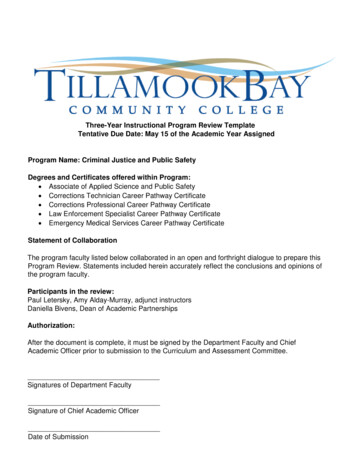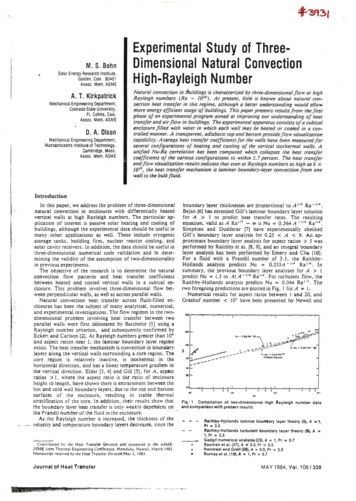
Transcription
in collaboration with:A Three-DayProgram on NegotiationGlobal CourseNEGOTIATIONFOR EXECUTIVESAT LUISS GUIDO CARLIVIALE ROMANIA 32 ROME, ITALY18, 19 AND 20 MAY 2017.in collaboration with:
1Dear Executive,At the Program on Negotiation (PON) at Harvard Law School, weare dedicated to studying the theory and practice of negotiation,so that others can learn to effectively manage conflict,solve problems, and build stronger relationships in their work,their families, and their communities. At PON, a consortiumprogram of scholars from Harvard, MIT and Tufts, we studynegotiation through many different lenses, including business,law, government, economics, psychology, and education. PON atHarvard Law School is delighted to be cooperating with LUISS School of Lawand ADR Center to offer for the first time in Italy our PON Global Negotiationfor Executives Course. This course is modelled on our flagship program taughtin Cambridge, Massachusetts, three days of intensive and innovative learning.PON Global Negotiation for Executives will enable you to have an interactivelearning experience, taught by a skilled and experienced PON instructor. Youwill also be exposed to the thinking of almost a dozen members of our faculty,through our video modules and in videoconferencing with Harvard faculty. Thecourse is designed to be highly interactive, with the use of negotiation exercisesand simulations. We believe that negotiation is an essential skill for all leadersand executives, and we know that with training, everyone can become a betternegotiator. When you are a skilled negotiator, you will have greater success atclosing deals, developing partnerships, and avoiding costly disputes. If you areready to become a more skilled negotiator and a more effective leader, I stronglyencourage you to join our program in Rome, Italy this spring. We look forward towelcoming you to this limited enrollment program.Sincerely,Robert H. MnookinFaculty ChairProgram on Negotiation at Harvard Law Schoolin collaboration with:
2LUISS School of Law (LSL) represents an innovation in thefield of legal studies in Italy. LSL was conceived within the frameworkof the international strategic objectives being pursued by LUISSGuido Carli, one of Italy’s leading institutions. It is targeted towhoever intends to acquire or further develop outstanding legaltraining or to deepen the scientific research in the various branchesof Law with an international focus. The teaching activities proposed byLSL aim both at students wishing to continue their studies at an advancedlevel and at those who are currently working and wish to specialize.Therefore, the background and the level of participants of LSLcourses are quite heterogeneous, including, alongside recentgraduates, professionals with significant professional experience. LSL standsout for its professional orientation. Courses are rigorous in academic terms, whilekeeping a close focus on everyday reality and practical experience. The essentialgoal is to enrich participants’ know-how so that they can work at the highestlevels. This is tremendously useful in terms of consolidating the aspirationsto grow professionally, allowing participants to better prepare themselves foroutstanding professional work-paths.As a leading provider of Alternative Dispute Resolution (ADR) servicesin Europe, we administer more than 4,000 civil and commercial mediationsper year and we witness every day the importance of the use of negotiationskills in making and saving deals. Unfortunately, most of the time companyrepresentatives and their advisors keep in mind only the technical and legalissues without planning a detailed negotiation strategy. For more than 18 years,ADR Center has been in the front row in Europe in coaching executives andlawyers to improve their negotiation skills for better results.Leonardo D’UrsoADR CenterCo-founder and CEOWe are particularly proud of cooperating with the Program on Negotiation atHarvard Law School and LUISS School of Law by offering for the first time in Italythe world-renowned, three-day course, “Negotiation for Executives”, developedby some of the leading negotiation scholars of PON.in collaboration with:
3ABOUT THE PROGRAMWidely recognised as a world leader in the field of negotiation and negotiation research, the Program onNegotiation is an interdisciplinary, multi-university research center based at Harvard Law School. Scholars fromHarvard, MIT and Tufts develop negotiation principles and skills and share them in innovative courses that helptrain global leaders.THE WORLD-RENOWNEDPROGRAM ON NEGOTIATIONPON Global “Negotiation for Executives” is a uniqueprogram that largely mirrors the extremely popularflagship program that PON has offered in Cambridge,Massachusetts, for more than 30 years. The programwill test your beliefs and assumptions and help youovercome emotional and rational biases, examinecomplex negotiation scenarios, and discover a range ofcompetitive and cooperative negotiation strategies.In this acclaimed program, we compress 30 years ofgroundbreaking research into three thought-provokingdays. In sessions taught by our expert faculty and withdynamic videos and video conferencing segments,you’ll broaden your understanding of negotiatingconcepts, acquire proven negotiating techniques, andhave the opportunity to put your learning into practice.This time – and road-tested – curriculum has beenutilised by more than 35,000 executives who haveparticipated in PON’s Executive Education programs.This spring, you can join their ranks and acquire aframework for negotiation—equipping you to overcomebarriers, manage conflict, and achieve better outcomesat the bargaining table, every single time.The Program on Negotiation at Harvard Law School is widely recognized as a world leader in the field of negotiation and negotiationresearch. The Program on Negotiation is an interdisciplinary, multiuniversity research center based at Harvard Law School.Harvard MIT Tuftsin collaboration with:
45 REASONSTO ATTEND PON GLOBAL “NEGOTIATION FOR EXECUTIVES”DEVELOPBETTERLEADERSHIPSKILLSAll great leaders are skilled negotiators. While some have innate ability,everyone can improve their ability to negotiate effectively by learning fromthe negotiation experts. At the Program on Negotiation, with our 30 years ofexpertise, we accelerate your learning process and focus on techniques thatwork in the corner office and at the bargaining table, as well as in your personallife and community.GET THE DEALSYOU WANT ANDBUILD STRONGRELATIONSHIPSThe strategies you learn over this three-day program will help you finaliseimportant deals, negotiate in uncertain environments, improve yourworking relationships, claim (and create) more value, and resolve seeminglyintractable disputes. You’ll work through complex scenarios and learnproblem-solving tactics that you can apply to all future negotiations.LEARN FROMTHE EXPERTSYou will learn from an on-site PON instructor as well as from leading PONfaculty in video modules made especially for this course. You will alsovideoconference with faculty back in Cambridge, Massachusetts, whocan answer your questions. PON faculty members have negotiated peacetreaties, brokered multi-billion dollar deals, and hammered out high-stakesagreements around the globe.LEARN BYPRACTICINGThe PON program is very interactive. In addition to class instruction, you willengage in negotiation exercises that put your new knowledge to work rightaway. You’ll test groundbreaking theories, practice new approaches, and seehow other participants address the same problems. You’ll leave the programwith a time-tested toolkit—one that works in both theory and practice.GIVE ANDRECEIVEQUALITYFEEDBACKIn the real world, we rarely get feedback on how we negotiate. Feedback isessential for continuing to grow and improve. In this course you will learnfrom others what you did well and what you might want to improve; and youwill learn to give feedback to others so that they receive it well and can makeadjustments.in collaboration with:
15DAY 1“UNDERSTANDING KEYNEGOTIATION CONCEPTS”MODULE 1:NEGOTIATION FUNDAMENTALSMODULE 2:CREATING VALUE VS. CLAIMING VALUEWe will share with you core concepts of negotiation,including the importance of integrative bargaining andshared problem-solving. We will outline the coursemethodology, which is highly interactive, and showhow the Program on Negotiation has helped developinnovative learning strategies. This session provides aframework for preparing for and analysing negotiations.You will examine the key elements of negotiation:We will discuss how to handle the “Negotiator’sDilemma” and how to create value while also ensuringyour fair share of distributed value. You will learn aboutthe need for careful preparation, which includes thinkingabout the other side’s “back table” as well as your own.We will discuss how to respond to different tactics andhow to feel confident about your ability to drive thenegotiation. Learn to clarify your interests and priorities, andthen think about your counterpart’s interests.Which interests are shared, and which are different?Learn about the difference between interests andpositions.Identify the range of alternatives you are willing toconsider if your counterpart does not give consent.Learn to analyse a negotiation problem and seekways to create value. Brainstorm possibleagreements or concessions that may creativelysatisfy both parties’ interests.Assess your relationship with your counterpart anddetermine if you can take steps to generate positiveemotions and avoid negative reactions.Prepare for your negotiation, and outline yourcommunication strategy. What do you want tolearn from them? What are you willing to share?What is your agenda and how will you handledisagreements or stalemates? What process doyou want to propose? Learn the advantages of adopting a cooperativemindset.Learn strategies for building trust.Know when to share information – and when not.Understand the importance of knowing or guessingat the zone of possible agreement.Learn to evaluate risk and learn defensive movesagainst aggressive claiming.Consider the implications of opening offers.Know the importance of being aspirational andwell-prepared.“In my 30 year professional experience, this is the bestnegotiation program I have participated in. I am adedicated ambassador to spread the word as to its value!”Konstantina VitoratouNicosia PON Global ParticipantThrough negotiation exercises and interactivediscussions, you will examine ways to structure thebargaining process to accommodate joint problemsolving, brainstorming, and collaborative fact-finding.You will learn how to evaluate a best alternative toa negotiated agreement (BATNA), create a zone ofpossible agreement (ZOPA), and implement the mutualgains approach to negotiation. As a result, you will beable to think more clearly, make smarter moves, andset the stage for more productive negotiations.in collaboration with:
2DAY 2“MANAGING INTERPERSONALDYNAMICS”MODULE 3:BEST PRACTICES FOR DIFFICULTSITUATIONS.MODULE 4:DEALING EFFECTIVELY WITH EMOTIONSAND RELATIONSHIPSWhat makes some negotiation situationsdifficult and how do most people deal withthem? We will discuss typical responses andbetter ways to respond when there arechallenging people or problems with which todeal. You will learn practical skills and theimportance of active listening. You will alsoimprove your ability to analyse a situation andchoose the appropriate strategy andresponse.To be effective, executives must learn tonavigate personality differences, diverseagendas, and social pressures. You willlearn that how your counterpart feelsabout the negotiation with you mattersand what you can do to generatepositive feelings. You will be taught howto have the “difficult conversation” andhow to separate out intention fromimpact. You will learn the Core Concernsthat need to be addressed in order tomanage emotion in negotiations. Finally,you will do an exercise that helps youunderstand your own style of negotiationand the style of others.“Masterfully delivered and effective for novices andexperienced negotiators alike.”Tal BrownTel Aviv PON Global Participant“Extremely useful, not only for my business life, butalso for my personal interactions. I leave the coursewith more self-knowledge.”Canstantinos RaftakisAthens PON Global Participantin collaboration with:6
3DAY 3“ADDRESSING NEGOTIATIONCOMPLEXITIES”MODULE 5:NEGOTIATING ACROSS CULTURESLearn how to overcome barriers tonegotiating effectively across cultures byunderstanding differences in law, languages,professions, behaviour, attitudes, values andother factors. Learn strategies for dealingwith cultural differences in negotiation andbe aware of how others may perceive yourculture. Understand how complex yournegotiation counterpart may be and avoidstereotypes. Acquire strategies for bridgingcultural divides so that you can negotiatemore effectively.“Harvard PON unlocked a previously unknowndimension of myself which not only enabled me tobecome a better negotiator but also communicateand connect more effectively. I recommend it to everyperson without reservation.”MODULE 6:MULTI-PARTY NEGOTIATIONS,INTERNAL NEGOTIATIONS,AND ORGANIZATIONAL CHALLENGESAND RELATIONSHIPSThe final session builds on youraccumulated knowledge to generatedescriptive and prescriptive insights fornegotiating across a variety of competitivecontexts. Faculty will bring to life differentnegotiation problems and examine theirreal world outcomes. Learn sophisticatednegotiation moves for working in highlycomplex situations and plan ahead foryour future negotiations.As a result of your participation, you willbecome a more effective decision makerand negotiator over the long term. Youwill also be better prepared to acquiresupport from your organisation as youlead future negotiations.Nikolas KoukounisNicosia PON Global Participant“Amazing program, great coach, terrific people onvide
At the Program on Negotiation (PON) at Harvard Law School, we are dedicated to studying the theory and practice of negotiation, so that others can learn to effectively manage conflict, solve problems, and build stronger relationships in their work, their families, and their communities. At PON, a consortium program of scholars from Harvard, MIT and Tufts, we study negotiation through many .











